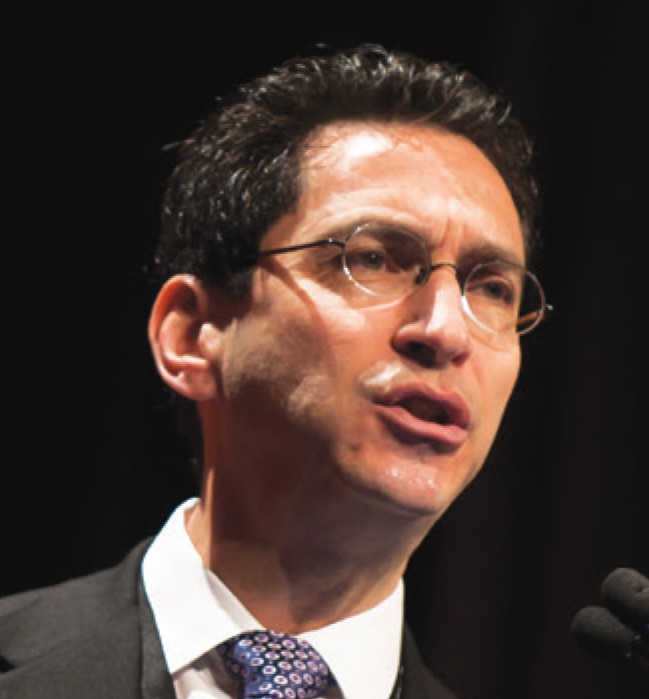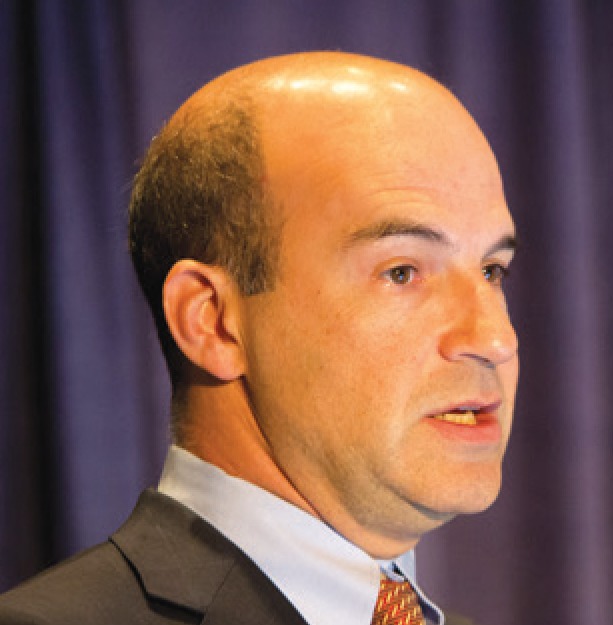Leonard B. Saltz, MD.

Photo by © ASCO/Brian Powers 2012
Leonard B. Saltz, MD, Chief of Gastrointestinal Oncology at Memorial Sloan Kettering Cancer Center, NY, wants the new checkpoint inhibitors to be available to his patients, but he questions how society will pay for them.
Offering his perspective on value during a plenary session presentation at ASCO 2015, Dr Saltz estimated that the widespread use of immunotherapy agents could cost the United States $174 billion annually.
The most attention-grabbing study presented at the meeting was a testament to the benefit of checkpoint inhibitors. CheckMate 067 evaluated the anti–PD-1 agent nivolumab plus the anti–CTLA-4 agent ipilimumab in patients with advanced melanoma. The immunotherapy doublet combination yielded a median progression-free survival of 11.4 months compared with 6.9 months for nivolumab alone and 2.9 months for ipilimumab alone.
Peter B. Bach, MD, MAPP.

Photo by © ASCO/Scott Morgan 2015
“A median progression-free survival of 11.4 months for combination immunotherapy is truly remarkable, for a disease that 5 years ago was thought virtually untreatable,” Dr Saltz remarked. “As a clinician, I want these drugs and others like them to be available for my patients. As one who worries about how we will make them available and minimize disparities, I have a major problem, and that is that these drugs cost too much.”
How much? “Approximately 4000 times the cost of gold,” according to Dr Saltz. Prices from the first quarter of 2015 show the average per-mg wholesale prices to be $28.78 for nivolumab, $51.79 for pembrolizumab (the other anti–PD-1 agent), and $157.46 for ipilimumab.
Dr Saltz calculated that the treatment cost for a typical patient receiving the CheckMate 067 combination would be $295,566. The use of nivolumab alone would cost $103,220, and ipilimumab alone, which yielded a median duration of remission of <3 months, would cost $158,252.
Rounding this up to approximately $300,000 for an individual patient with a 20% copay, Dr Saltz determined that the patient's out-of-pocket cost would total $60,000.
Dr Saltz projected that applying the total figure to the 589,430 patients dying from metastatic cancer annually, the treatment would cost society $173,881,850,000.
“That's $174 billion for drugs treating patients with metastatic disease—no adjuvant therapy—for 1 year only,” he emphasized.
Dosing and Scheduling Are Cost Drivers
Peter B. Bach, MD, MAPP, Director of the Center for Health Policy and Outcomes, Memorial Sloan Kettering Cancer Center, suggested in a separate presentation that lower doses of checkpoint inhibitors may be as effective as higher doses, and considerably less expensive.
Dr Bach referred to the pivotal study of pembrolizumab versus ipilimumab in advanced melanoma (Robert C, et al. N Engl J Med. 2015;372:2521–2532), which involved pembrolizumab at 10 mg/kg every 2 or 3 weeks. The investigators indicated a “lack of a dose–response relationship…congruent with results” of the KEYNOTE-001 and KEYNOTE-002 trials of the drug, showing that “the administration of pembrolizumab at doses ranging from 2 mg per kilogram every 3 weeks to 10 mg per kilogram every 2 weeks did not affect outcomes.”
“The authors noted that a lower dose is equally effective…. That sounds like equivalence,” Dr Bach suggested.
But what is clearly not equivalent, he said, is the cost of using these different schedules of pembrolizumab dosing. Dr Bach figured the monthly costs for an average-sized patient at $9000 for 2 mg/kg every 3 weeks; $46,000 for 10 mg/kg every 3 weeks; and $69,000 for 10 mg/kg every 2 weeks. Dr Saltz's calculation for the highest dose was even higher, at $83,500.
At this cost, for the highest and most often administered dose, a 75-kg patient with melanoma receiving 26 courses of pembrolizumab would result in a treatment cost of $1,009,944.
“This is unsustainable…. We must acknowledge that there must be some upper limit to how much we can, as a society, afford to pay to treat each patient with cancer,” Dr Saltz said.


